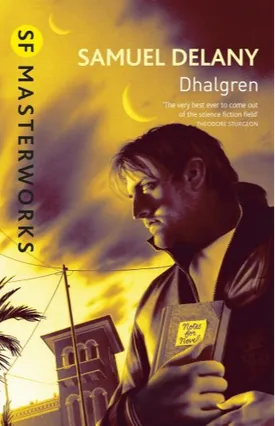Samuel R. Delany
Samuel Ray Delany, Jr (born April 1, 1942) is a prolific, African American novelist, essayist and critic of science fiction and fantasy. He is a four-time winner of both the Hugo and Nebula Awards, earning twenty-one Hugo Award nominations and six Nebula Award nominations. Delany is considered one of science fictions most celebrated authors and is the author of more than twenty novels and hundreds of short stories, in addition to his non-fiction writings.
Delany was born in Harlem, New York, to father Samuel Ray Delany, Sr., and mother Margaret Carey Boyd Delany. His father was a public relations professional and his mother was a library clerk. Delany was exposed to science fiction early on in his life due to his father’s interest in science fiction and fantasy. As a child, he read a great deal of science fiction, which shaped his sensibilities.
Delany attended the Bronx High School of Science and graduated at the age of 16. He attended City College of New York from 1958 to 1962 and majored in physics, though he dropped out without completing his degree. During this time, he also wrote several of his earliest published science fiction stories.
In 1962, Delany moved to New York City, where he established himself as a prominent member of fandom circles and a major science fiction writer. Delany’s early science fiction works, such as “Aye, and Gomorrah” (1967), "The Star Pit" (1967) and Babel-17 (1966) earned both critical and commercial success.
In 1972, Delany published his ground-breaking novel Dhalgren. It is the story of a city called “Bellona” which has been struck by a mysterious event known only as “the Change”. In the wake of the Change, the novel’s protagonist, Kidd, finds himself caught up in a struggle for control of the city. Dhalgren pushed the boundaries of genre fiction and experimented heavily with its form and content, earning it a Hugo Award in 1975 as well as the status of a science fiction classic.
In 1974, Delany published a science fiction novel, Triton, which explored the idea of gender and identity. The novel followed a young genderqueer protagonist, Bron Helstrom, as he navigated a society defined by rigid gender divisions. The novel earned the 1976 Nebula Award for Best Novel and helped spark more in-depth discussions of gender identity within science fiction literature.
In 1976 Delany published the novel Tides of Lust, which he considers one of his most important works. The novel follows several characters in a highly sex-positive, post-revolutionary society. Tides of Lust was the first major science fiction novel to depict a society free of conventional gender roles, and it earned Delany a Nebula Award for Best Novel in 1977.
In the 1980s, Delany reestablished himself as a significant postmodern author, with works like Stars in My Pocket Like Grains of Sand (1984) and Phallos (2004). These works often explored themes of identity and cultural fragmentation, and frequently featured characters from highly marginalized backgrounds.
Throughout his career, Delany has earned a multitude of awards and nominations, including the Hugo Award for Best Novel for his works Neveryon (1983) and Einstein Intersection (1967). He has been inducted into the Science Fiction Hall of Fame (2002) for his literature and was awarded the Pilgrim Award from the Science Fiction Research Association in 2006 for his work as a critic.
Delany continues to write and to teach at numerous universities. His latest novel, 2017’s Through the Valley of the Nest of Spiders, has been described as a hybrid of science fiction and memoir. He also writes regularly for New York review of Books and The Washington Post. Delany’s contribution to science fiction literature has been incomparable and his impact on readers will be felt for generations to come.

